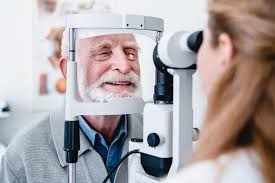Arizona's Vision Eye Care Center
Opening Hours
Mon-Thu: 9:00AM - 6:00PM Friday: 8:00AM- 5:00PM
Our Location
15215 S. 48th Street #180 Phoenix, AZ 85044
Call NOW
Menu
Does Medicare require a referral to see an ophthalmologist?
Original Medicare (Parts A and B) does not require a referral to see an ophthalmologist. You can visit any eye specialist who accepts Medicare without getting approval first. This freedom helps seniors in Phoenix get timely eye care when problems arise.
Arizona's Vision Eye Care Center understands the confusion around Medicare rules. With over 20 years of experience, our team knows exactly how different Medicare plans work for eye care services.
This article explains when referrals are needed, what Medicare covers for eye care, and how to prepare for your appointment. You'll learn everything needed to access quality eye care without unexpected costs.


If You Have Original Medicare (Parts A & B)
Original Medicare gives you direct access to specialists without gatekeepers. This freedom helps seniors get specialized care quickly when eye problems develop. No referral is needed to see an ophthalmologist with Original Medicare. You can schedule appointments directly with any eye specialist who accepts Medicare assignments.No referral needed to see an ophthalmologist
Original Medicare lets you see specialists without referrals. This direct access applies to ophthalmologists, retina specialists, and other eye doctors. You can make appointments without first visiting your primary doctor. The system works by covering 80% of approved costs after your deductible. You pay the remaining 20% for medically necessary eye care services.Choose any specialist who accepts Medicare
You can select any ophthalmologist who takes Medicare patients. This freedom gives you options to find the best specialist for your specific eye condition. Many ophthalmologists in Phoenix accept Medicare patients. The key is confirming they accept Medicare before your appointment to avoid surprise bills.Ensure the specialist accepts Medicare assignments
Specialists who accept Medicare assignments agree to charge only approved amounts. This acceptance protects you from excess charges beyond what Medicare approves. Non-participating providers can charge up to 15% more than Medicare-approved amounts. This extra cost comes directly from your pocket as an additional expense.If You Have a Medicare Advantage (Part C) Plan
Medicare Advantage plans replace Original Medicare with private insurance rules. These plans often have different referral requirements that limit direct specialist access.Referral rules differ from Original Medicare
Medicare Advantage plans set their own referral policies. These rules vary by plan type and insurance company. Your plan documents explain the specific requirements. The referral process helps coordinate your care. However, it adds an extra step before seeing specialists.Many plans, especially HMOs, require a referral from your primary care provider
HMO Medicare Advantage plans typically require referrals for specialist visits. Your primary doctor must approve and document your need to see an ophthalmologist. PPO plans offer more flexibility with specialist access. Many PPO plans allow direct specialist visits without referrals but at higher costs.Special Needs Plans (SNPs) may also require referrals
SNPs focus on specific health conditions with coordinated care. These specialized plans typically require referrals to maintain care coordination. The referral requirement helps your care team track your treatment. This coordination benefits patients with complex health needs.Exceptions and Special Cases for Referrals
Certain situations bypass normal referral requirements. These exceptions ensure you get care when urgently needed.Emergencies/Urgent Eye Issues (Referral Not Needed)
Emergency referral Medicare exceptions apply for sudden vision problems. Symptoms like sudden vision loss, eye pain, or injury qualify as emergencies. You can go directly to emergency care without prior approval. Medicare Advantage plans must cover emergency services regardless of network status.Post-Operative/Co-Management Situations
Follow-up care after eye surgery often has simplified referral processes. Your surgeon and optometrist may have co-management agreements for your recovery care. This arrangement streamlines your post-surgical appointments. The specialists coordinate your care without requiring new referrals.What to Bring to Your Ophthalmology Appointment
Proper preparation ensures smooth Medicare coverage for your eye care visit. These items help verify your coverage and medical history.Medicare/MA Card and Photo ID
Bring your Medicare card or Medicare Advantage card to every appointment. This identification confirms your coverage details and eligibility for services. Your photo ID verifies your identity. Both documents are essential for proper billing and service authorization.Referral or Authorization Number (If Applicable)
If your plan requires a referral, bring the documentation. This paperwork includes the authorization number and approved service details. Missing referrals can result in denied claims. Always confirm referral requirements before specialist appointments.Conclusion
Medicare's referral requirements depend on your specific plan type. Original Medicare offers freedom to see specialists directly, while Medicare Advantage plans often require referrals. Arizona's Vision Eye Care Center helps Phoenix patients navigate Medicare coverage. Our team works with all Medicare plans to ensure proper coverage for your eye care needs. Call us today to schedule your ophthalmology appointment. We'll help verify your coverage and explain any referral requirements for your specific Medicare plan.
Looking for top eye care in Phoenix? Our expert optometrists provide quality vision exams, glasses, and contacts. Book your appointment today!